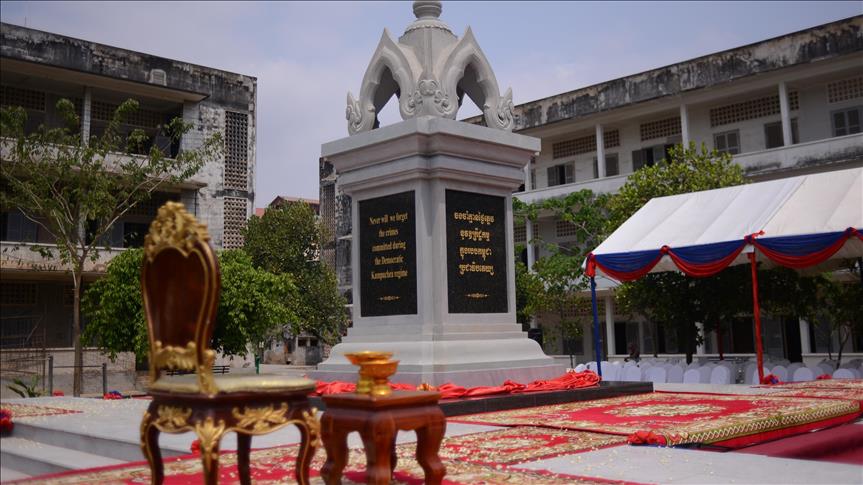Cambodia: Khmer Rouge duo’s life terms upheld by court
Chief ideologue Nuon Chea, 90, and ex-head of state Khieu Samphan, 85, again found guilty over deadly population movements

By Lauren Crothers
PHNOM PENH, Cambodia
Cambodia got its “Nuremberg moment” Wednesday when life sentences were upheld against the two most senior surviving members of the Khmer Rouge regime.
The judgment closed a brutal chapter in the country’s history that began with the forced evacuation of Phnom Penh 41 years ago.
The decision was rendered by a panel of judges in the Khmer Rouge tribunal's Supreme Court Chamber, who had considered hundreds of pages of appeals filed by chief ideologue Nuon Chea, 90, and former head of state Khieu Samphan, 85.
Both were originally found guilty of crimes against humanity in what is known as Case 002/01 in August 2014.
On Wednesday, the elderly duo was impassive and stony-faced as they sat side by side in the dock while Judge Kong Srim read the verdict, which contained some variations from the original Trial Chamber ruling from two years before.
In the earlier verdict, they had been found criminally responsible for the evacuation of Phnom Penh on April 17, 1975, a second forced movement of people, and the execution of Lon Nol soldiers and officials at a remote, rural site.
On Wednesday, convictions against the pair for crimes committed at that site were reversed, but they were found guilty of murder in relation to the two population movements.
Convictions of the crime against humanity of extermination were reversed by the panel in relation to both of those movements.
The verdict was heralded by Deputy Prime Minister Sok An as a “historic” moment for the country.
Around 1.7 million people perished in the agrarian nightmare that began when Khmer Rouge forces battled their way into Phnom Penh, overtook the city from Lon Nol forces and emptied it out on the premise that residents would be able to return a few days later.
That never happened.
Instead, millions of people carved routes out of the sunbaked city on foot, laden with whatever belongings they could carry.
Bound for rural labor camps and villages, the scenes became emblematic of the regime’s indiscriminate intent to put people to work and squeeze every last grain of rice out of the land.
Speaking to reporters after the verdict, the United Nations’ special expert on the court, David Scheffer, said the verdict was a “Nuremberg moment” in reference to the trials in which Nazi perpetrators were convicted.
“Despite setbacks, the long arm of justice can ultimately prevail,” he said.
In a statement, the U.S. Embassy in Phnom Penh said it welcomed the verdict, adding that the U.S. would continue to provide support to the court.
Nicholas Koumjian, the international co-prosecutor, told reporters that he didn’t agree with all of the details of the judgment, but that the depth of deliberation over the past two years was something to be proud of, and that “a life sentence is justice.”
Nuon Chea’s international defence lawyer Victor Koppe told reporters that he’d been “pleasantly surprised by many considerations” put forward by the panel of judges, and was “quite delighted” with the decision to scrap the convictions related to Toul Po Chrey.
Khieu Samphan’s international lawyer, Anta Guisse, described Wednesday’s decision as “cosmetic justice”.
The Supreme Court Chamber judges have had the past two years to consider their reasons for passing this final judgment.
Long Panhavuth, a court monitor with the Cambodia Justice Initiative, told Anadolu Agency on Wednesday that while not necessarily surprising, the verdict would have long-term importance.
“It’s very important that the Supreme Court Chamber is a last resort and not a rubber stamp body,” he said. “It’s important for rule of law in Cambodia and for international jurisprudence.”
The tribunal is the first hybrid court of its kind, with assistance provided by the UN and international donors, within Cambodia’s domestic court system.
Hundreds of millions of dollars have been spent on keeping the court running.
The pair is currently being tried in the second phase of Case 002, which is known as Case 002/02, which focuses on crimes of genocide, purges and forced marriage.
In Case 001, S-21 prison jailer Kaing Gek Eav, alias Duch, was jailed for life by the Supreme Court Chamber in 2012.
Anadolu Agency website contains only a portion of the news stories offered to subscribers in the AA News Broadcasting System (HAS), and in summarized form. Please contact us for subscription options.

